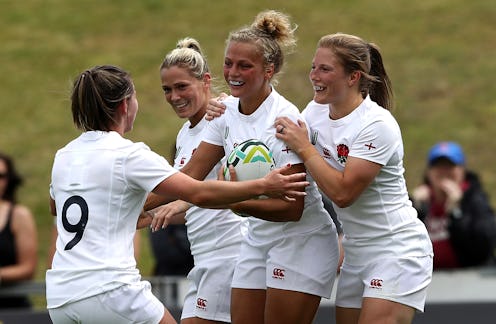Life
This Is How Long It Takes To Make A New Friend, According To Science

Friendship can take some time to develop and deepen — and even though you can probably think of at least one special bestie who you instantly felt a connection with, science says that the timeline of how our friendships develop is actually pretty specific. According to a new study published by Jeffrey A. Hall in the Journal of Social and Personal Relationships, researchers figured exactly how long it takes to make a new friend on average. Hall, a communications professor at the University of Kansas, conducted two separate studies after studying the work of evolutionary psychologist Robin Dunbar. Dunbar’s research suggests that there are layers, or levels, of friendship that the brain processes in specific ways, with a sort of mathematical logic, according to Tonic. So even if you feel that special click, or immediate connection with someone, it still takes time for the brain to register a genuine bond or closeness with that person.
Dunbar suggests that most of us tend to classify our friendships as follows: acquaintances, casual friends, friends, and close friends. He also notes that most people are genuinely close to about five people — those are our best, or closest, friends. We may have a crew of about 15 people we call friends, but the brain can’t really process having relationships with more than 150 people overall, the Independent reports.
Based on this work, Hall conducted two separate studies to examine Dunbar’s findings further — paying close attention to how hours spent together correlated to feelings of closeness for participants. The first study included 355 adults who had relocated to a new city within the previous six months. Hall asked them to identify someone new they had met — not including someone they’d known before, a family member, or a romantic interest. Participants were then asked to specify where they met this new person, how much time they spent together in a typical week, and how much time they’d spent together in the previous week. Participants were also asked to qualify this person as either an acquaintance, a friend, or a best friend.
In the second part of the study, Hall surveyed 112 college freshman over a nine week period. The students were asked to identify two new people they had met at school, and over the course of the study, Hall observed how these new relationships developed over time.
Hall’s findings suggest that it takes about 50 hours to progress from acquaintances to casual friends, 90 hours to become friends, and 200 hours to progress from friends to best friends, according to the Independent. Hall states that time spent together doesn’t guarantee closeness, however — the quality of time spent together is key. “When you spend time joking around, having meaningful conversations, catching up with one another, all of these types of communication episodes contribute to speedier friendship development,” Hall explained to Psychology Today. In order for relationships to develop in terms of significance, closeness, and feelings of intimacy, “You have to invest,” Hall says. When we express to another person that, “Whatever is happening in your life I want to bring into the present of my relationship with you,” we cultivate closeness with that person. “Consider how many people you don’t bother to ask,” Hall continued, “You wander into the office and you say hey, that’s it.”
Hall’s Communicate Bond Belong theory further explores how we all feel an intrinsic evolutionary need to belong with others. The amount of time we invest in our relationships, plus the quality of time shared, equates to mutual feelings of bonding, belonging, and friendship. Investing in both time and the quality of that time with the people in our lives is an investment in deeper, more lasting, and more fulfilling relationships.